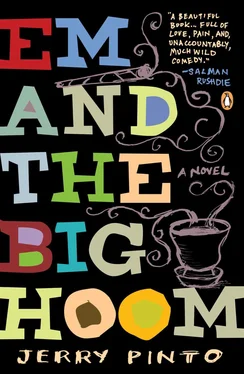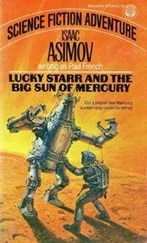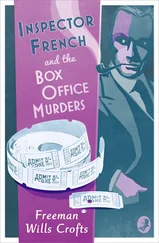Jerry Pinto - Em and the Big Hoom
Здесь есть возможность читать онлайн «Jerry Pinto - Em and the Big Hoom» весь текст электронной книги совершенно бесплатно (целиком полную версию без сокращений). В некоторых случаях можно слушать аудио, скачать через торрент в формате fb2 и присутствует краткое содержание. Год выпуска: 2014, Издательство: Penguin Books, Жанр: Современная проза, на английском языке. Описание произведения, (предисловие) а так же отзывы посетителей доступны на портале библиотеки ЛибКат.
- Название:Em and the Big Hoom
- Автор:
- Издательство:Penguin Books
- Жанр:
- Год:2014
- ISBN:нет данных
- Рейтинг книги:3 / 5. Голосов: 1
-
Избранное:Добавить в избранное
- Отзывы:
-
Ваша оценка:
- 60
- 1
- 2
- 3
- 4
- 5
Em and the Big Hoom: краткое содержание, описание и аннотация
Предлагаем к чтению аннотацию, описание, краткое содержание или предисловие (зависит от того, что написал сам автор книги «Em and the Big Hoom»). Если вы не нашли необходимую информацию о книге — напишите в комментариях, мы постараемся отыскать её.
Em and the Big Hoom — читать онлайн бесплатно полную книгу (весь текст) целиком
Ниже представлен текст книги, разбитый по страницам. Система сохранения места последней прочитанной страницы, позволяет с удобством читать онлайн бесплатно книгу «Em and the Big Hoom», без необходимости каждый раз заново искать на чём Вы остановились. Поставьте закладку, и сможете в любой момент перейти на страницу, на которой закончили чтение.
Интервал:
Закладка:
But the real fear was not that I wouldn’t know how to earn money. It was this: life without The Big Hoom meant life with Em on her own — no, life with Em and no buffer. What if I had to open another door to find that she had sawed at her wrists with one of the knives we had blunted? How would I judge how much blood she had lost and whether she needed a blood transfusion or not? Could that be administered at home? If she died, would I know whom to bribe and how to bribe to make sure it would not turn into a police case? And where would I find the money to bribe, in the first place? What if I put all our savings in a risky business that failed?
At that point I realized what it meant to be a man in India. It meant knowing what one could do and what one could only get done. It meant being able to hold on to two patterns simultaneously. One was methodical, hierarchical, regulated and the outcomes depended on fate, chance, kings and desperate men. The other was intuitive, illicit and guaranteed. The trick was to know when to shift between the patterns, to peel the file off a table and give it to a peon, to speak easily of one’s cousin the minister or the archbishop. I did not think I would ever know what these shifts entailed, and that meant, in essence, that I was never going to grow up. Or, and a goose walked over my grave, I would only grow up when The Big Hoom died. Only then would I learn how to deal with the world, this city, this life.
But how did one acquire such knowledge? Did it arrive in the moment itself, the understanding that this was not a man to be suborned, that this was a man who could be subverted? How did other people manage? There must be different ways for every level of society, that much I knew. But what was the way for the son of a mad woman, a ‘vedi’ in the schoolboy argot of the playground? Anger didn’t show the way. Nor hurt.
So how had he managed? How had The Big Hoom grown to the estate of masculinity? Most days I saw him as the perfect man, even in his dense silences that could leave you bleeding for a word in either direction. Then I would correct myself, slowly brutalizing him and so myself and my family. No, he was not a paragon. A paragon would also have been good-looking and would not have thick glasses, passing on to his children the myopia that would have them in spectacles before they were in their teens. Perhaps a paragon might have spotted what was wrong with Em before he married her. A paragon would have been more than a mere crisis manager. And a paragon would have expressed his feelings.
Had Em been the able parent, would things have been different?
This was an exercise that defeated me so completely that I was forced to recognize that The Big Hoom was indeed my paragon. Perhaps I did not want to recognize it only because it made me like every other boy I knew. But they somehow overthrew their fathers or dethroned them or got past them. There was no getting past The Big Hoom.
• • •
The Big Hoom’s story has the mythic resonance of India in it. I might never have found out, never asked him about it, had it not been for a trip to Goa that we made together. Why weren’t Susan and Em there? I don’t know. I don’t remember. It was not a funeral, it was just something that happened. Perhaps The Big Hoom himself had engineered it.
On the second day, after he had been cried over by sundry old women, most of whom would remain nameless to me, we went for a walk together in the village to which he had never shown much desire to return. Em said it was something to do with the property. He had signed away his rights to prevent a family feud turning into a court case. It hadn’t helped and he was now a Goan with no land in Goa.
He was wearing a banian with his office trousers, an odd combination, while I loped beside him, a clumsy fourteen-year-old, unsure of what it meant to be on a holiday with my father, alone. The phrase ‘male bonding’ was far in the future.
He stopped after we had walked half a furlong, or some distance I imagined to be half a furlong, and looked up at a tank that had been erected on two brick columns with a metal rod, about six feet long, hanging between them.
‘When Mr Fernandes built that tank, it seemed like the ultimate modern contraption. Everyone came from miles around to see it being built. Now, it looks like a giant with his dong hanging out of his pants.’
He startled a giggle out of me, because he did not use words like dong. He didn’t respond and we walked down a thirsty path, all red mud and stones.
‘This was a green and shady walk when I was a boy,’ he said. ‘They’ve cut down all the trees.’
The church appeared somewhere to our left.
‘That was the biggest building I saw before I went to the Basilica in Old Goa,’ he said. ‘That’s probably why I went to Bombay from Poona.’
‘Poona?
‘I went to Poona to sit for what you would call a board examination. It was like another planet: a huge world of cars and buses and cycles and noise. On the first day, I felt dizzy at the thought of so many people. All of them looked like they were about to crash into each other but at the last minute they would manage to slip past. It was like watching a hundred games of football going on at once and me in the goal, waiting for a hundred balls, none of which I could see.’
He stopped for a while and then shook his head a little.
‘Why did you go to Poona?’
‘It was the closest centre for the English examination. I didn’t want to study in Portuguese.’
‘The language of the overlords.’
‘I don’t think it had much to do with that,’ he said. ‘It was just that there seemed to be more jobs available to people who spoke English.’
I fell silent. I felt silly. But then I was fourteen. I could be made to feel silly if someone sneezed.
‘There were many boys from Bombay at the school where I was staying. In those days, boys from Bombay would sit for their exams in Poona if they could manage it. I think they felt that the competition would not be as stiff, that they would shine in comparison.’
Among them was Mario, from Dhobi Talao. ‘You think this is a city?’ he asked scornfully, as the boys sat on the steps of the dormitory of the school. ‘Come to Bombay. Now that’s a city.’
‘I don’t know anyone in Bombay,’ said Augustine, aged fifteen.
(Was he being disingenuous? Or was he really an innocent from Moira? I didn’t ask.)
‘You know me,’ Mario said grandly. ‘Come and see.’
And so it was decided, on the spur of an invitation and a moment, on the challenge of a city vaster and grander than he could imagine, that Augustine would go to Bombay.
‘I had money to go home. I used it on a ticket to Bombay. I don’t know what I was thinking. Or whether I was thinking about money at all. I had never had any before that, no pocket money, no spending money. Everything I had was second-hand or third-hand or bought for me. So perhaps I thought one could get on without money.’
Mario’s mother came to receive him. The Big Hoom was not big on details but I imagined her in the standard garb of the Goan Roman Catholic lower-middle-class housewife. She would have been in a white-ish rayon shirt — not quite white because white is difficult to keep clean, who has the time? — embellished with fake lace. From under the collar, two pink satin ribbons falling limply on her chest. A black skirt riding under her paunch. And on her feet, low slippers that showed her cracked heels and the bunions on her toes. There would have been a faint smell around her, a smell of worry — Mario’s exams, husband’s alcoholism, Maria’s marriage, her own over-strained budget, the leaking bathroom, the troublesome boss who did not understand why she had to take an hour off to fetch her son from the station; the worry that had carved a single deep line between her brows. I realized later that I was dressing her with the contempt of my class and the notions of my time. Rayon would not have been as popular at the time. And that entire outfit was more 1980s than 1950s.
Читать дальшеИнтервал:
Закладка:
Похожие книги на «Em and the Big Hoom»
Представляем Вашему вниманию похожие книги на «Em and the Big Hoom» списком для выбора. Мы отобрали схожую по названию и смыслу литературу в надежде предоставить читателям больше вариантов отыскать новые, интересные, ещё непрочитанные произведения.
Обсуждение, отзывы о книге «Em and the Big Hoom» и просто собственные мнения читателей. Оставьте ваши комментарии, напишите, что Вы думаете о произведении, его смысле или главных героях. Укажите что конкретно понравилось, а что нет, и почему Вы так считаете.











